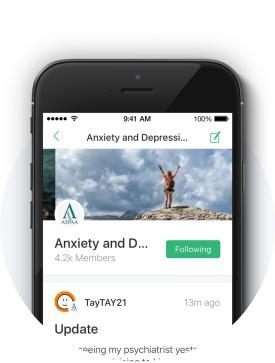- Taking Care Of Yourself - NAMI
- AARP Local Caregiver Resource Guides - AARP
- Caregiver Depression: A Silent Health Crisis - Caregiver.org
- Caregiver Stress - womenshealth.gov
- Signs of Stress - Care Giver Stress
- Caregiver Depression: Prevention Counts - Mayo Clinic
- 11 Ways to Stop Caregiver-Related Depression - Aging Care
 40%-70% of caregivers
40%-70% of caregivers
show symptoms of depression with approximately a quarter to half of these caregivers meet the diagnostic criteria for major depression.
Depression
Being a caregiver can be physically and emotionally stressful. When taking care of a loved one, caregivers often put other's needs before their own. Caregivers often sacrifice a lot of time, energy and their own physical and emotional needs which could lead to stress, anxiety, and/or depression.
Signs and Symptoms of Depression in Caregivers3
- Avoiding pleasurable or meaningful activities because you feel guilty about taking time off from caretaking
- Repetitive nightmares or intrusive thoughts about the patient/loved one, including the diagnosis, treatments, or future prognosis
- Inability to sleep
- Feelings of exhaustion, severe tiredness
- Feelings of tension
- Inability to concentrate or remember details
- Anxiety attacks about not properly following the medical regimen
- Inability to talk to others about your experience as a caretaker
- Anticipatory anxiety about future treatments for the patient/loved one
- Inability to enjoy activities you once found pleasurable
- Thoughts of suicide because you feel so overwhelmed, worthless, or inadequate
- Chronic irritability
If you or someone you know are experiencing any of these signs and symptoms, please consult your doctor or contact a mental health provider here.
Click here for more information about depression.
Anxiety
Anxiety disorders are real, serious medical conditions - such as heart disease or diabetes. Anxiety disorders are the most common and pervasive mental disorders in the United States. Loss of control, fear of a loved one's well-being, uncertainty about the future or worrying about healthcare finances can all become extremely overwhelming for caregivers and can result in anxiety and stress.
Signs and Symptoms of Anxiety in Caregivers2
- Constant fearfulness, worry or impending doom
- Depression that lasts longer than two weeks
- Trouble eating
- Shortness of breath that keeps coming back
- Sleep problems
- Heart racing or beating hard in the chest
- Constant irritability
- Excessive sweating
If you or someone you know are experiencing any of these signs and symptoms, please consult your doctor or contact a mental health provider here.
Click here for tips on managing anxiety and stress.
ADAA Resources
- Serious, Chronic, or Terminal Illnesses -Tips for Patients and Caregivers
- Anxiety Disorders in Older Adults
- Treating Anxiety and Depression in Older Adults
ADAA's Online Support Group
 ADAA’s anonymous peer-to-peer online anxiety and depression support group is a friendly, safe and supportive place for individuals and their families to share information and experiences. As a member you can connect with other people experiencing anxiety and depression and related disorders, contribute to ongoing conversations or start your own conversation with a question or a post about your journey. Click here to learn more.
ADAA’s anonymous peer-to-peer online anxiety and depression support group is a friendly, safe and supportive place for individuals and their families to share information and experiences. As a member you can connect with other people experiencing anxiety and depression and related disorders, contribute to ongoing conversations or start your own conversation with a question or a post about your journey. Click here to learn more.
ADAA Grupo de Apoyo en Línea
 Grupo anónimo peer-to-peer línea de apoyo ansiedad y la depresión de ADAA es un lugar agradable, seguro y de apoyo para los individuos y sus familias para compartir información y experiencias. Como miembro, usted puede conectar con otras personas que experimentan ansiedad y la depresión y los trastornos relacionados, contribuir a las conversaciones en curso o iniciar su propia conversación con una pregunta o un post acerca de su viaje. Apreta aquí para aprender más.
Grupo anónimo peer-to-peer línea de apoyo ansiedad y la depresión de ADAA es un lugar agradable, seguro y de apoyo para los individuos y sus familias para compartir información y experiencias. Como miembro, usted puede conectar con otras personas que experimentan ansiedad y la depresión y los trastornos relacionados, contribuir a las conversaciones en curso o iniciar su propia conversación con una pregunta o un post acerca de su viaje. Apreta aquí para aprender más.
Haga clic aquí para suscribirse hoy
Trending Articles
- Depression Can Deepen Over Time for Alzheimer's Caregivers, USNews.com, September 9, 2020
- Calling for a Culture of Caregiving, RealWorldHealthCare.org, with Ruth Lippin, ADAA member, July 12, 2019
- The Stress of Caregivers
- Coping With Stress When You’re in the Sandwich Generation
- Caregivers with Depression Slip through the System
- Depression, Anxiety and Stress Symptoms in Family Caregivers
- Anxiety Busters: 5 Ways to Overcome Your Anxiety
- Caregiving Burden, Stress, and Health Effects Among Family Caregivers of Adult Cancer Patients
- How Mindfulness Can Help Caregivers
- Caregiver. 2002. Caregiver Depression: A Silent Health Crisis.
- Help for Cancer Caregivers. Anxiety.
- Mayo Clinic. Caregiver Depression: Prevention Counts.













